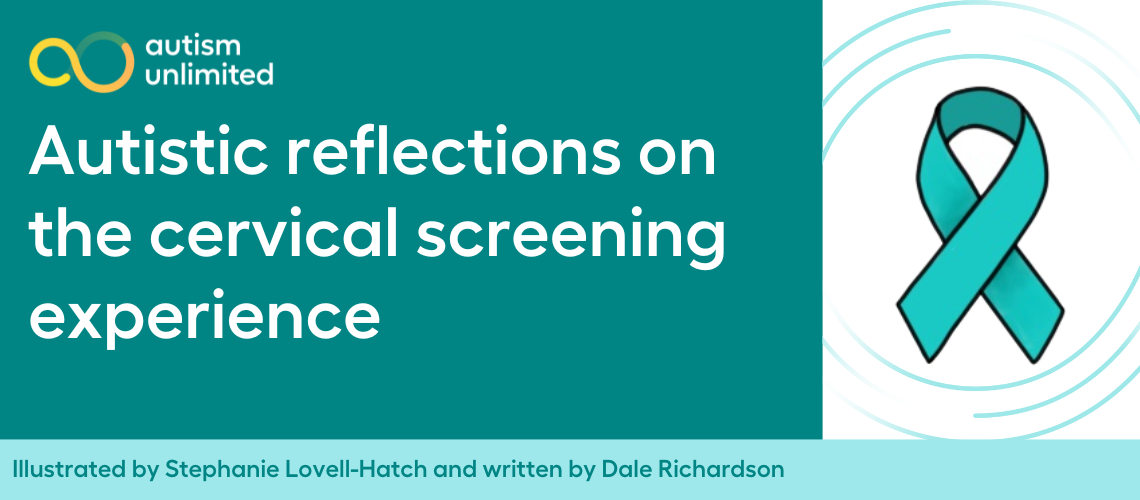Autistic reflections on the cervical screening experience

Autistic reflections on the cervical screening experience:
What is it and why is it so important?
The cervical screening (or smear test) checks the health of your cervix (which is the opening to your womb from your vagina). During the appointment, a small sample of cells are taken from your cervix and checked for certain types of human papillomavirus (HPV) that can cause changes to the cells in your cervix. The cervical screening is not a test for cancer, it's a test to help prevent cancer (NHS, 2021). The cervical screening procedure is important because it is one of the best ways to protect yourself from cervical cancer. Regular screening is associated with a 67% reduction in cervical cancer which translates to a 70% reduction in deaths from the disease (Mayor, 2016).
What challenges does the cervical smear present for our community?
A 2014 report undertaken by Public Health England highlights a significant discrepancy in cervical screening coverage between adult populations with and without learning disabilities. Although it was difficult to obtain data relating specifically to attendance of cervical screening appointments and prevention of cervical cancer in Autistic adults due to a conflation of Autism and learning disabilities across the literature, it is safe to say that a similar discrepancy is likely to exist between Autistic and non-Autistic patient populations.
Why is this the case?
A cervical screening can be particularly challenging due to the invasive nature of the procedure and the physical and emotional discomfort it can result in. The procedure might also interact unhelpfully with common Autistic qualities such as differences in how we understand what our body is feeling (interoception), our experience of pain (hypo/ hyper sensitivity) and difficulties in noticing and identifying how we feel (alexithymia).
Co-occurring conditions commonly experienced in the Autistic community such as gastro-intestinal issues and joint hypermobility disorders can also have an impact on an Autistic patient’s experience of a cervical screening procedure.
For those of us who are trans or otherwise gender non-conforming and experience gender dysphoria- another layer of discomfort is often added.
Nurse practitioners and doctors may have a limited understanding of the unique and significant ways in which autism and its associated issues impact a patient’s experience of a given medical procedure. This means that the particular supports that might help to alleviate discomfort could be lacking.
We might encounter resistance to our own attempts to self-regulate and take care of our sensory and emotional needs during the appointment. We may even experience medical gas lighting or invalidation when attempting to express our experience or request much needed accommodations (we know that this happens at higher rates amongst female presenting people, people of colour and those with additional learning disabilities in our community). For those of us with a history of these types of experiences, just being in a medical environment could feel threatening and unsafe.
**What is my experience as an Autistic person?***
As an Autistic non-binary person with hypermobility, attending a cervical screening can result in sensory overwhelm and shut downs both during and following the procedure. This is in part as a result of the sensory experience of a visit to a hospital environment as a person with sensory processing sensitivities, social anxiety and misophonia but also due to over-contracted pelvic floor muscles as a result of hypermobility which can result in a drawing out of the procedure and related discomfort.
Although the nurse practitioners I have encountered have been sensitive to potential feelings of exposure and discomfort, my communication of pain experienced has often been minimised or overlooked which has resulted in a heightened feeling of dread in advance of appointments and a lack of confidence in the support offered during.
Lack of recognition and sensitivity around gender diverse and trans identities in medical environments where misgendering is often only the tip of the iceberg can also prove challenging, as well as the dysphoria triggered by exposure and intrusion into intimate areas of the body.
* Please note that this is only an account and reflection of my own personal experiences as one Autistic person with a particular set of qualities and traits, this is not a prediction of what others might encounter or an attempt to generalise my own experience to the broader community.
So, why should I attend?
In addition to the usual sensory, social and communication challenges faced by Autistic people during hospital appointments, this is a more than reasonable question- it could be tempting to avoid this kind of experience altogether.
However, we want to stress the importance of attending your cervical screening to best protect yourself against the risk of developing cervical cancer. You will gain important information about how your body is functioning and the support you might need to stay healthy. Consistent (approximately five-yearly) attendance will mean that you can feel reassured in the knowledge that you are in the clear, or gain timely access to appropriate medical intervention for a better prognosis. This examination, however unpleasant, is quite literally lifesaving.
We also think that it is deeply wrong that people in our community continue to pay the price for unmet access needs in medical settings. This is an urgent problem that demands institutional change on a broad scale and a shift in mind set amongst medical staff on the ground.
However, we can’t afford to wait for a healthcare system in crisis to catch up with the diverse needs of our community. So, in the meantime, we want to empower you and for you to empower one another to take this important step in looking after the health of your body. In support of this aim, we have compiled some supportive pre, during and post appointment steps to give you the best chance of both attending and getting through your appointment as comfortably as possible.
Cervical Screening Support Tips:
Preparation: in order to best prepare for a cervical screen, some actions might include ~
- Considering your sensory needs- pack a bag with sensory aids such as headphones, earplugs, coloured glasses, stim tools, comfort items and so on to support your comfort whilst at your appointment.
- Considering your communication needs- perhaps take a trusted friend or family member to support with verbal communication, a hospital passport that you can share with staff or notes including scripted comments or responses that you can refer to during the appointment to support with or replace verbal speech.
- Wear suitable clothing that can be easily taken on and off.
- To minimise uncertainty, research what is involved in the cervical screening procedure before attending so that you have a good idea what to expect.
- Write out a list of questions to avoid relying on memory during a potentially stressful experience.
- Plan your travel route in advance and leave plenty of time to get to your appointment to minimise anxiety and allow time to adjust to the environment upon arrival.
- Engage in calming, grounding techniques prior to the appointment start time.
During: whilst at the appointment it may be helpful to ~
- Ask for the nurse practitioner to talk you through the procedure in full before it commences, preferably with use of images or demonstrations with relevant equipment.
- Be open about which aspects of the experience you might struggle with as an Autistic person and request particular adjustments.
- Engage in grounding techniques such as mindful breathing.
- Hold on to a stim object that is comforting or acts as a stress reliever.
- Listen to music to support self-regulation.
- Share your concerns or worries with the nurse practitioner to invite reassurance or helpful advice.
- Remember your reason for attending and why it is important for you.
Aftercare: following the procedure, it is a good idea to plan in some time for self-care and self-regulation, some ideas might include ~
- Get yourself into a sensory safe space where things feel predictable and calm (for e.g. a quiet room with dim lighting, weighted blanket etc).
- Arrange to debrief/chat to a friend or another supportive person about your experience after leaving your appointment.
- Arrange to meet with a trusted person following the procedure to support you with getting back home or perhaps to do something you might enjoy together.
- Engage in your dedicated interest.
- Acknowledge your achievement in attending and getting through the appointment.
- Journal about your experience to help with emotional processing.
- Engage in your favourite stim to release any tension that may remain in your body.
- Allow yourself to physically rest or sleep once back at home.
References:
NHS website. (2021, November 18). Why it’s important. nhs.uk. https://www.nhs.uk/conditions/cervical-screening/why-its-important/
Mayor, S. (2016). Screening reduced cervical cancer deaths by more than two thirds, UK study finds. BMJ, i5026. https://doi.org/10.1136/bmj.i5026
Public Health England. (2014). Health-care-learning-disabilities. webarchive.nationalarchives.gov.uk. Retrieved December 12, 2022, from https://webarchive.nationalarchives.gov.uk/ukgwa/20171011011112tf_/http://content.digital.nhs.uk/catalogue/PUB22607/Health-care-learning-disabilities-2014-15-summary.pdf
Further information:
Written by Dale Richardson and illustrated by Stephanie Lovell-Hatch.






